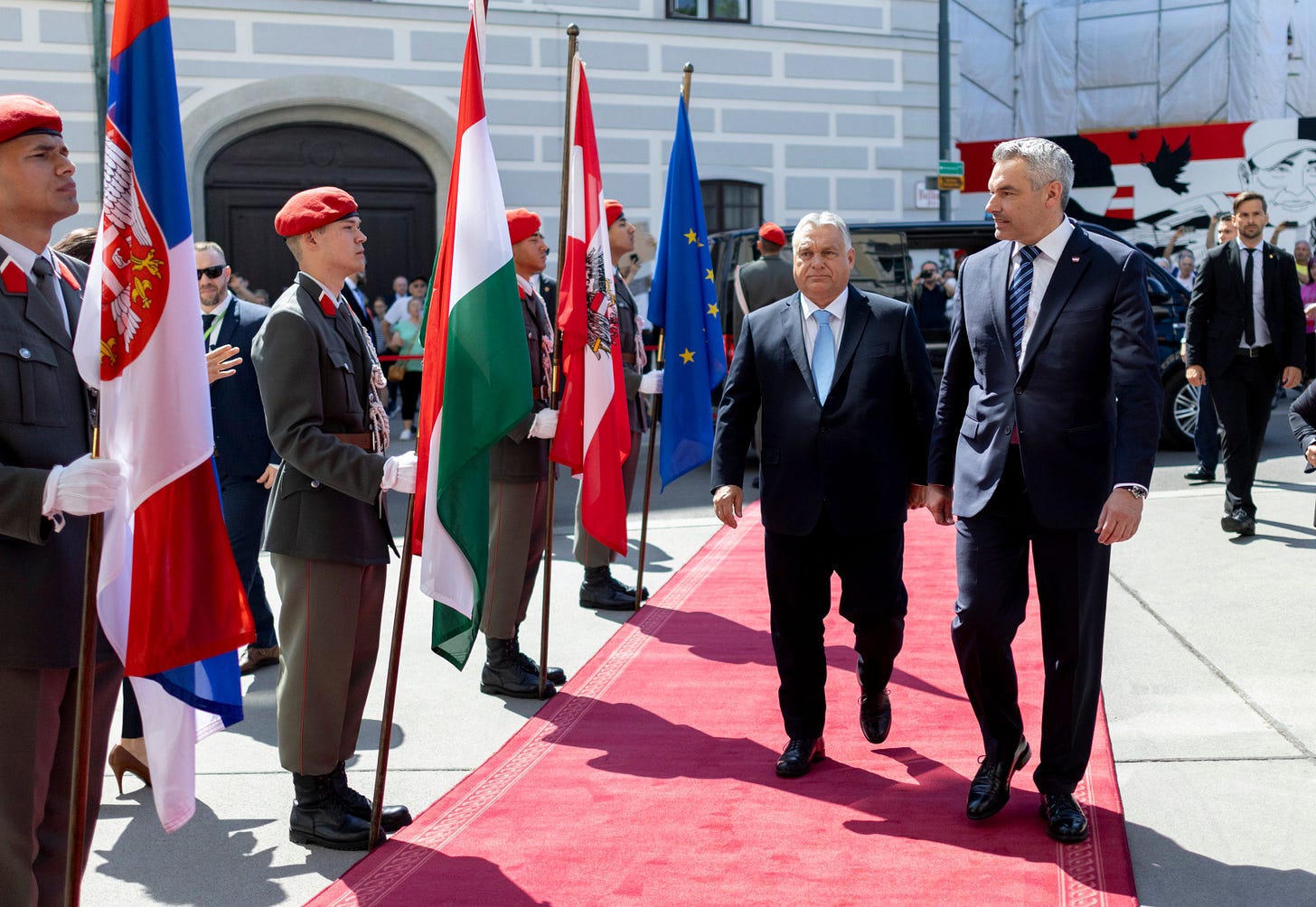The Orbán Conundrum
Austria played host to a tripartite summit last week, hoping the leaders of Hungary and Serbia will help tackle irregular migration into Europe

Servus!
On Friday, chancellor Karl Nehammer rolled out the red carpet for Hungarian prime minister Viktor Orbán and Serbian president Aleksandar Vučić, as he hosted a tripartite summit on migration. This was the third meeting between the three leaders to talk about this subject, having convened in Budapest in October and Belgrade in November of last year. At the Belgrade summit, Austria, Hungary, and Serbia formalized their cooperation, signing a memorandum of understanding promising a more hard-line approach to the thorny issue of irregular migration.
In 2022, almost 109,000 asylum applications were lodged in Austria, a country with a population of 9 million people. For context, 84,000 applications were recorded in Italy, population 59 million, and last year in Europe, only Germany, France, and Spain had more asylum seekers apply for shelter in their countries. While Afghanistan and Syria continue to be the primary states of origin for refugees in Austria, in 2022, 20,000 asylum seekers came from India, 13,000 Tunisia, and 9,000 Morocco. Undocumented migrants from these countries have no hope of being granted asylum in Austria.
Tackling irregular migration is a practical concern for the government and the country’s immigration authorities, especially when one considers the strain processing thousands of asylum applications that will never be approved places on Austria’s bureaucracy. It is also, for the governing conservative People’s Party (ÖVP), a political or electoral one, for a complete halt to all asylum, transforming Austria into a hostile environment for migrants in the process, is the cornerstone policy of the far-right Freedom Party (FPÖ), a party on the rise which is eating into the ÖVP’s vote share.
Hungary and Serbia are both classified by Freedom House as partly free nations. Since 2010, Orbán has “pushed through constitutional and legal changes that have allowed” him and his party “to consolidate control over the country’s independent institutions, including the judiciary” and erode independent civil society. In Serbia, meanwhile, Vučić has “has steadily eroded political rights and civil liberties, putting pressure on independent media, the political opposition, and civil society organizations.” In order to do something about irregular migration, Austria has got itself into bed with two of Europe’s most autocratic, undesirable leaders.
The ÖVP has defended its migration pact with Hungary and Serbia as a form of Realpolitik—80 percent of irregular migrants entering Austria pass through Hungary, after all—that has led to concrete improvements. In January, Serbia ended visa-free travel for Indian and Tunisian passport holders. The result of this has been a dramatic drop off in the number of irregular migrants from those countries applying for asylum in Austria. As of May, 18,000 asylum applications have been made in Austria in 2023, with most applicants coming from Syria, Afghanistan, and Morocco.
But there is an obvious limit to what this pact can achieve, and that limit is Viktor Orbán. 109,000 asylum applications were made in Austria in 2022; in Hungary: 45. Hungary is not an end destination for asylum seekers but a transit state in which, per Freedom House, the “rights of refugees and asylum seekers are routinely violated” and it is “nearly impossible for individuals to apply for asylum and receive protection.” With a nod and a wink, irregular migrants are sent on to points west—including Austria. Orbán and his right-wing populist partners in Poland have also proven an obstacle to a pan-European solution to irregular migration. Ultimately, there is no incentive for Orbán to help either Austria or the ÖVP when the status quo works just fine for him, thank you very much.
Bis bald!
Thank you for subscribing to the Vienna Briefing. If you know someone who might be interested in receiving this newsletter, consider sharing it with them today.
The Vienna Briefing is a reader-supported publication. If you would like to support my work, think about sending me a tip via PayPal. Thank you to all contributors.
Thank you to
at and at for sharing last week’s newsletter on Austria’s gender war, which has become the most-viewed edition of The Vienna Briefing to date. I would encourage you to subscribe to their Substacks.Let’s See
Chancellor Nehammer has ruled out a coalition with the FPÖ that would make its leader Herbert Kickl chancellor. Nehammer branded Kickl a Russian propagandist and a security risk. He did not rule out an ÖVP-FPÖ coalition in toto.
Division Over Sky Shield
41 percent of Austrians are in favor of Austria joining the European Sky Shield Initiative while 43 percent are opposed. Sky Shield is a German-led initiative that aims to create a European air and missile defense system through the common acquisition of air defense equipment and missiles.
Stay At Home
Salzburg’s planned stay-at-home parenting credit will exacerbate problems in the state’s tight labor market, economists fear. The policy was pushed by the FPÖ, which is the junior partner in Salzburg’s state government led by the ÖVP.




That’s awesome. I thought it was such an interesting post (and thanks for the shout out!)